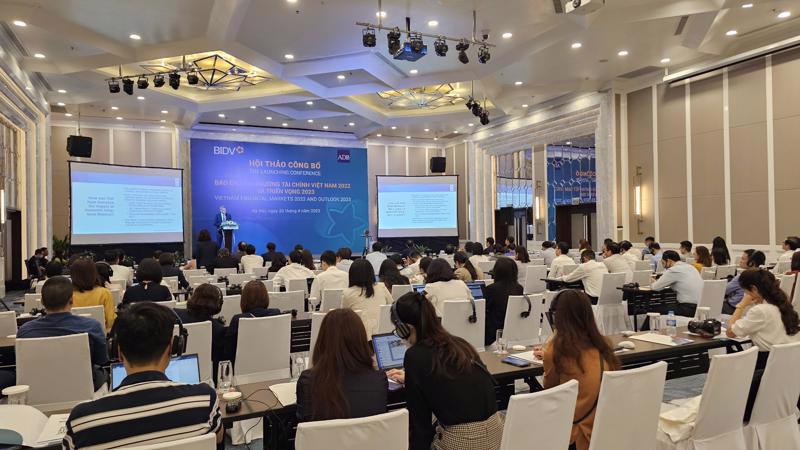The Bank for Investment and Development of Vietnam (BIDV) and the Asian Development Bank (ADB) co-held a meeting on April 20 to release the “Vietnam financial markets 2022 and outlook 2023” report, with a focus on the green financial market in Vietnam.
Following on from the success of last year’s report, the 2023 edition is the result of research by a team of ADB and BIDV experts.
Looking back on 2022, the report states that Vietnam’s financial market is still in the development stage and easily affected by external factors. As a result of previous economic stimulus packages and the conflict in Ukraine, global inflation increased rapidly last year, causing central banks in many countries to implement tight monetary policies by rapidly increasing interest rates, causing exchange rate fluctuations and increasing global monetary-financial risks. Vietnam was no exception, with the State Bank of Vietnam (SBV) having to raise operating interest rates, intervene in the foreign exchange market, and conduct open market operations to ease exchange rate pressure and control inflation.
Vietnam’s financial market faces problems in tighter liquidity, rising interest rates, and more difficult access to capital (especially through corporate bond issuances). The risk of interconnection between the money-capital and real estate markets has become clearer, with violations by some real estate enterprises on the stock market causing the stock market and corporate bond market to decline.
However, with operating experience, flexible policies, and synchronous coordination, Vietnam’s financial market has basically regained stability, contributing to increasing the ability to supply capital, invest, and allocate capital to the economy and stabilize the macro-economy.
In 2023, given the slight recession in the global economy, slower price growth and inflation, a more stable exchange rate, and a gradual decline in interest rates (but still at a high level), the financial and banking markets are facing many potential risks.
Vietnam’s economic growth in 2023 is expected to slow to 5.5-6 per cent, with inflation likely to be higher than the 2022 figure, reaching 4-4.5 per cent.
Regarding trends in Vietnam’s financial markets this year, the research team forecast that profit growth in financial institutions will be lower than in 2022. Regulatory frameworks have been adjusted to support market development. Customer behavior shifted after Covid-19, driving digital transformation in the financial sector. The country’s fintech sector has witnessed rapid growth, but current regulations on fintech remain inadequate. And, notably, green finance is developing to support green and sustainable growth in Vietnam.
Green finance is a major trend worldwide, with the participation of international financial institutions, national governments, and financial systems in each country and region. Vietnam is no exception, with the country implementing a green growth strategy and witnessing rapid growth in the green financial market over the years.
Mechanisms and policies for the green financial market in Vietnam are being gradually improved in each type of instrument, such as green-society-sustainable bonds, green stocks, carbon markets, and green credit. The current regulatory environment is relatively open for green financial products in Vietnam and helps businesses mobilize domestic and international green capital.
In the future, Vietnam promises to be an attractive destination for international green capital with an improved legal environment. Financial institutions and businesses are also making efforts to further develop the circular economy and green finance to mobilize resources for development investment as well as promote international integration for sustainable development.









 Google translate
Google translate